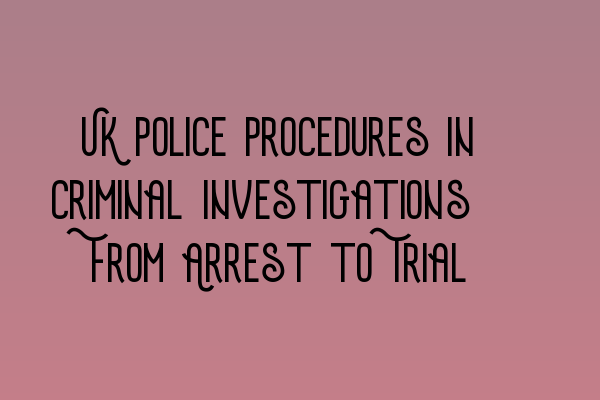UK Police Procedures in Criminal Investigations: From Arrest to Trial
When it comes to criminal investigations in the UK, understanding the procedures followed by the police is essential. Whether you are a defendant, a lawyer representing a client, or simply interested in the criminal justice system, this article provides an overview of the key steps involved from the moment of arrest to the trial.
Arrest
The first step in a criminal investigation is the arrest of a suspect. The police may make an arrest if they have reasonable grounds to believe that an offense has been committed. It is important to note that an arrest does not imply guilt; it simply means that the individual is being detained for further investigation.
During the arrest, the police will inform the suspect of their rights, including the right to remain silent and the right to legal representation. It is vital for the suspect to exercise these rights and seek legal advice immediately. This will ensure that they are aware of their options and can make informed decisions throughout the process.
Interview and Investigation
Following the arrest, the police will conduct an interview with the suspect. This interview may take place at the police station or another appropriate location. The purpose of the interview is to gather evidence and elicit a statement from the suspect.
It is crucial for the suspect to have legal representation during the interview. A solicitor with expertise in criminal law can guide the suspect through the process, protect their rights, and ensure that any statements made are fair and accurate.
During the investigation, the police will collect evidence, gather witness statements, and analyze any forensic materials. This stage is critical for building a solid case and supporting the prosecution’s claims. It is important for the defense team to review the evidence gathered by the police in order to identify any inconsistencies, errors, or potential weaknesses in the prosecution’s case.
Charge or Release
Once the investigation is complete, the police will decide whether to charge the suspect or release them without charge. If there is sufficient evidence to proceed, the suspect will be charged with the relevant offense. At this stage, the case will be transferred to the appropriate court for further proceedings.
If the police do not have enough evidence to proceed or if the evidence is deemed insufficient, the suspect will be released without charge. However, it is important to note that the investigation may continue, and charges may be filed at a later stage if new evidence emerges.
Preparation for Trial
After being charged, the suspect will enter the preparation phase for trial. This involves obtaining legal representation, gathering evidence, and building a defense strategy. A skilled criminal defense solicitor will carefully review all aspects of the case, identify potential issues, and ensure that the defendant’s rights are upheld throughout the process.
During this phase, it is essential for the defendant’s legal team to explore all possible defenses, challenge the prosecution’s evidence, and prepare for potential outcomes. This includes negotiating plea bargains, examining the admissibility of evidence, and identifying expert witnesses who can provide testimony in the defendant’s favor.
Trial
Once the preparation phase is complete, the case will proceed to trial. The trial will take place in a designated court, and the defendant will have the opportunity to present their defense and challenge the prosecution’s case. The court will review the evidence presented by both sides and deliver a verdict based on the facts and legal principles.
During the trial, the defense solicitor will cross-examine witnesses, present evidence, and make legal arguments to support the defendant’s case. It is important to have a skilled solicitor who is experienced in criminal law to ensure that the defendant’s rights are protected and that the trial is fair.
Throughout the entire process, from arrest to trial, the assistance of a knowledgeable criminal defense solicitor is critical. At SQE Criminal Law & Practice Law UK, we provide expert legal representation and guidance to clients involved in criminal investigations. Our team of experienced solicitors understands the complexities of the criminal justice system and will work tirelessly to protect your rights and achieve the best possible outcome for your case.
If you require further information about the SQE exams, we recommend checking out our related articles:
- SQE 1 Practice Exam Questions
- SQE 1 Practice Mocks FLK1 FLK2
- SQE 2 Preparation Courses
- SQE 1 Preparation Courses
- SRA SQE Exam Dates
Feel free to contact us at SQE Criminal Law & Practice Law UK for any inquiries or to schedule a consultation. We are here to assist you throughout your legal journey.
